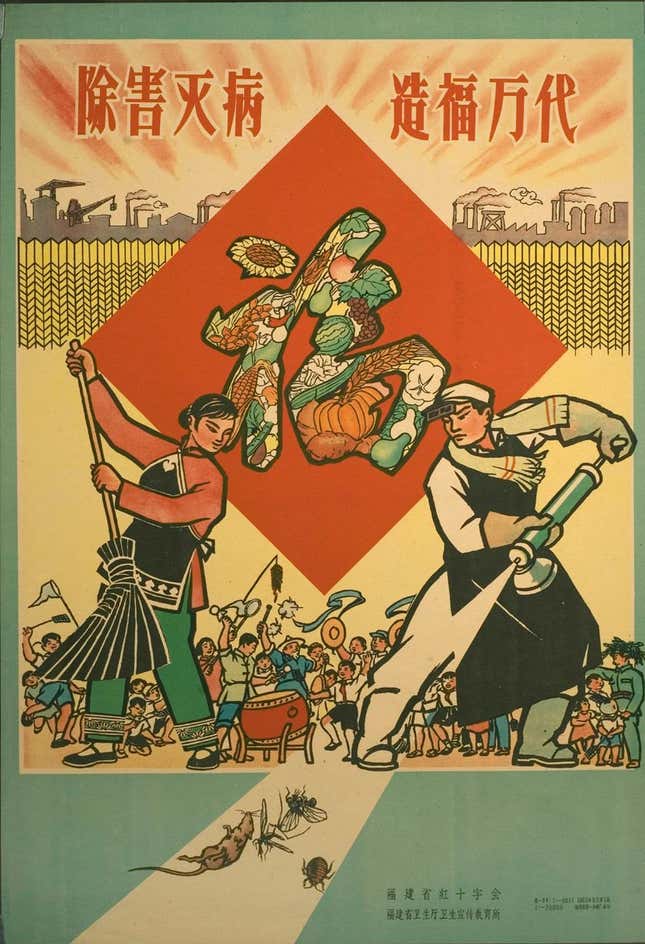At one point or another you’ve found yourself communicating with a colleague or a family member or a zoo animal that was just sitting there.
But did you stop to think, “Was my communication effective?” It may surprise you to hear that it was not. For one thing, the zoo animal ignored you, even when you shouted ”hey mister!” and “over here long-neck!”
Effective communication is important—particularly in the modern workplace. The deepest insights on the topic come not from management books or TED talks, but from one venerable source, the Communist Party of China, or CPC.

Look at the party’s reputation. First of all, it has to communicate with 1.3 billion people (the population of China). That is just a lot of communication, numerically. Second, the party has ruled China for nearly 70 years. You don’t rule for that long without solid communication skills.
The good news is that it’s not hard to adopt the teachings of this highly successful organization, which can be summarized in a few basic points.
1. Don’t ask. Tell.
Poor communicators often waste time fielding criticism or otherwise hearing people out. The lesson of the Communist Party is that people respond, above all, to strength. For your company or non-profit organization, it is more effective to decide what you want to do and declare that a decision has been made.
This comes in handy when you want to do something dramatic and controversial, like moving the coffee machine or banning freedom of assembly.
Ideas for the modern workplace: If you are a manager and your company uses an internal chat service like Slack or HipChat, be sure to automatically block messages containing keywords that reflect poorly on you, and shame/fire those who regularly send such messages.
2. Use vague metaphors to keep everybody guessing
During a state visit to the United States, party leader Xi Jinping offered this Chinese idiom: “peaches and plums do not talk, yet a path is formed beneath them.” Most people interpreted that to mean that the US and China could cooperate on important issues even though one was a peach and one was a plum.
But it’s weird because peaches don’t move or do anything that would form a path. In fact, the more common understanding of the idiom is that, because peaches and plums are beautiful and delicious, people regularly come to pluck them, resulting in a path. So maybe Xi actually meant, “It doesn’t matter if the US and China cooperate, because both countries are Great countries, so we might as well just sit here.”
Who knows?
The point is “who knows?” After all you can’t blame him for remarking on a peach. Keep them guessing.
Ideas for the modern workplace: Look over lists of proverbs before big meetings. How are we going to get eyeballs on this? “Plough deep while sluggards sleep, and you will have corn to sell and keep.” What’s the latest on the Findlay account? “A candle loses nothing by lighting another candle.” When should we circle back on this? “The road to hell is paved with good intentions.”
3. New initiatives should not be one thing, but a numbered list of things
Enumeration is a key quality of CPC communication. It is especially useful for rooting out negative elements in your company, autocracy, or non-profit organization.
For example, Mao Zedong wanted to get rid of pests. He didn’t focus on pests in general, or pests the concept, but called for the extermination of “the four pests.” Namely rats, flies, mosquitoes, and sparrows. The message worked. Because while Mao wanted to kill sparrows to prevent them from eating grain seeds, it turns out that they mainly eat locusts and other crop-eating bugs, so things actually got worse with regard to the grain when people killed the sparrows.
Unintended consequences are a key indicator that communication is having impact.

Ideas for the modern workplace: Numbered lists make your ideas convincingly voluminous. “Pests” don’t sound so bad, but what about four or even five of them. Consider a multiplier to give your new endeavor extra weight. For example, if you have too much incompetence, indecision, and two other things that start with “in–” venture to eliminate the “Four Ins.”
4. Shut down individuals by focusing on the group
Often in your communications, there will be people you disagree with. If you are in a position of power, you can simply ignore them (see number 1). Unfortunately, that strategy is not available to everyone, but there is another way.
The key is to show the group that the disagreeable person is self-serving and disruptive.
Lately, the Party has been using the phrase ”picking quarrels and provoking trouble.” Groups it doesn’t like, such as lawyers and feminists, are said to be ”picking quarrels and provoking trouble.” An artist who made a funny image of Xi Jinping was also ”picking quarrels and provoking trouble.”
This communication strategy has the dual advantage of discrediting the person you disagree with and getting everyone else to resent him or her.
Ideas for the modern workplace: ”Dale, your suggestion that we should get in touch with clients more regularly is just going to create more work for everyone. Stop picking quarrels and provoking trouble.”
5. Use unmemorable and confusing acronyms
The organizational structure of the CPC—sometimes referred to as the CCP—includes the CPPCC, additionally the NPC, and the CCDI and CAC, as well as the CNSC and CMC.
In this way nobody is ever quite sure who to blame for bad behavior!
Ideas for the modern workplace: Develop acronyms for each of your projects or tasks. Only refer to them by the acronym, and make sure the acronyms are somewhat similar. “I was focusing on ALG for most of last week, but now I really need to shift over to GLA and GGL.”
6. Refer to your enemies as various kinds of animals
This is similar to the metaphor strategy, but more specific. Specifically, you should refer to your enemies as animals like tigers, snakes, chickens, etc.
“I don’t have enemies” you might say. Then you simply haven’t thought of the appropriate animal.
A famous example of this is Mao’s phrase ”paper tiger,” meaning something that seems intimidating but is actually paper. This is a really clever variation on the animal idea, because not only are paper tigers not scary, they are quite cute.

Today Xi has an anti-corruption campaign targeting “tigers and flies.” The tigers are powerful corrupt people, while the flies are normal corrupt people. Even if you don’t have enemies at the level of tiger, surely there are some “flies” in your office.
Ideas for the modern workplace: “There are two kinds of people in this company: bears and snakes. Except Dale. Dale is a rat.”
